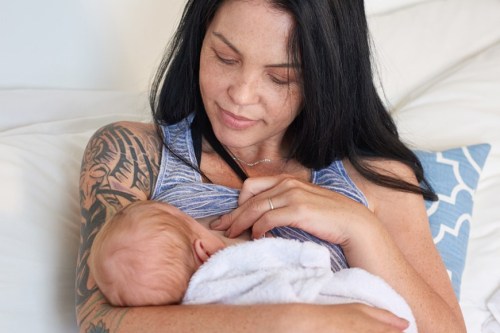Your baby might have your eyes, your nose, or your laugh. Another thing you pass along to your newborn? Your gut.
Your microbiome (AKA the system of bacteria and other tiny microbes that call your body home) may be located primarily in the GI tract, but its benefits extend from head to toe. It helps keep your digestion system running smoothly, stores more than 90 percent of your body’s serotonin (hello, happiness connection!), and is linked directly to your immune system. So let’s just say having a healthy microbiome is pretty important—and establishing that health begins even before the day you’re born.
While things like diet, stress, and lifestyle can alter your microbiome as you age, Raja Dhir, co-founder and co-CEO of the just-launched microbiome health company Seed, says your baseline gut health starts before you can even form sentences. “You have what’s called your ‘steady state microbiome,’ which is where the base-level community [of bacteria] has developed,” he says. “Situations later in life can alter the functionality of this, but the largest part of your microbiome is developed between the ages of zero and two.”

To boost the good bacteria in your gut, you may turn to probiotics. Babies, however, aren’t exactly popping supplements, so the responsibility for establishing this initial standard of gut health falls to their parents. And one way new moms can do this is by making sure they’re getting enough of certain key probiotics in their own diet.
To help set your baby’s microbiome up for success, look for a type of probiotic called bifidobacterium, which plays a key role in developing the infant’s microbiome and immune system during their first six months of life and is found primarily on the mother’s breast. (Not having enough bifidobacterium early on has also been linked to developing irritable bowel syndrome later on down the road.) “Because this [bacteria species] in particular comprises a large percent of the early infant’s microbiome, it’s really meaningful for them to be exposed to this early in life, whether that’s through breastfeeding or skin-to-skin contact,” Dhir says. So even if you’re not breastfeeding, cuddle time is super important. “[Bifidobacterium] programs the immune system as to how it will respond all the way into adulthood,” Dhir adds.
And you might want to start incorporating the probiotic into your regimen before you first set eyes on your kiddo. “Having probiotics before, during, and after pregnancy can really be beneficial to the mother,” says Gregory Reid, MD, one of the world’s leading probiotic experts. (He led the group that actually defined the term “probiotics” and is the chair of the United Nations World Health Organization’s expert panel on probiotics.) Probiotics can help prevent bacterial vaginosis after childbirth, something that’s pretty common—hey, bacteria balance is important down there, too—as well as help with other imbalances that can crop up during pregnancy, like digestive or skin issues.
“The largest part of your microbiome is developed between the ages of zero and two.” —Raja Dhir, co-founder of Seed
In addition to bifidobacterium, both Dhir and Dr. Reid say human milk oligosaccharides (HMOs) found in breast milk are crucial for your little one’s health. “HMOs are not a nutrient—you can’t find them in food or take a supplement for it; it’s something specific to breastmilk,” Dhir says. These undigestible carbs, he says, also play a massive role in developing a baby’s microbiome. They are so important that his company, Seed, has prioritized pinpointing microbes women can take to feed the growth of HMOs in their bodies. (Be on the lookout for the groundbreaking product early next year.)
Whether you breastfeed or not, laying a strong foundation for your baby’s health comes back to one of the major rules of motherhood: going with your gut.
If you’re not a new mom yet, here are answers to some of the most common pregnancy questions. Plus, what Saraka Life co-founder Danielle Duboise wishes she knew during her first trimester.
Sign Up for Our Daily Newsletter
Get all the latest in wellness, trends, food, fitness, beauty, and more delivered right to your inbox.
Got it, you've been added to our email list.











